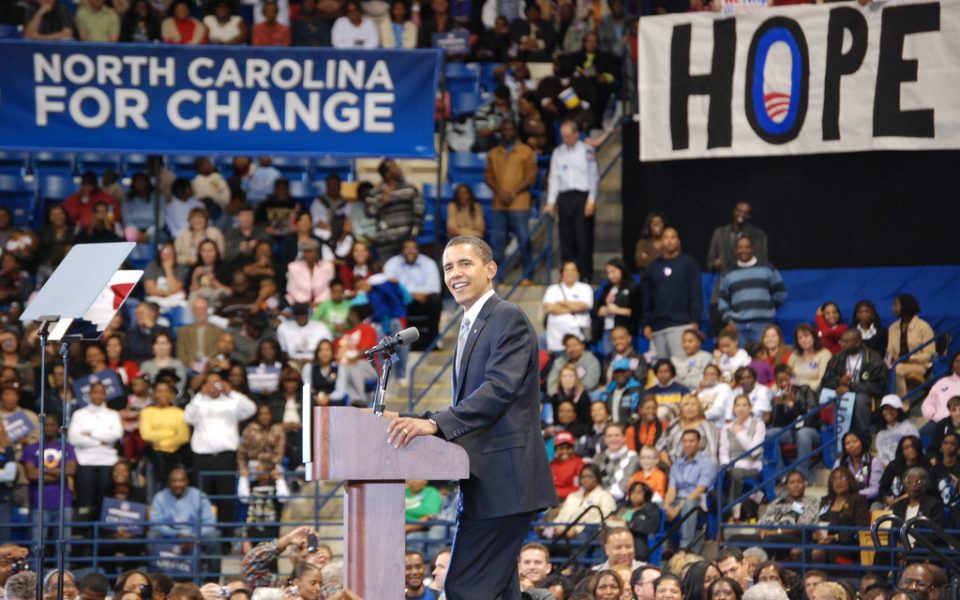I’ve been covering North Carolina elections since 2005, but my baptism in campaign coverage really begins with the epic primary election of 2008.
Forget that the campaign essentially began with now-disgraced North Carolina native son John Edwards’ December 2006 speech in Chapel Hill announcing a presidential campaign based on fighting poverty and addressing climate change. It’s hard for people to appreciate that even in January 2008, Hillary Clinton was considered to be the Democratic Party’s inevitable nominee; she had the foreign-policy experience and the toughness to vote in favor of authorizing a war, even if it turned out to be widely unpopular.
The idea that a black man with a funny, African-sounding name and a background as a community organizer could win the nomination seemed to many both wildly romantic and irresponsible. But then he carried South Carolina by 29 points and began to pile up win after win. Suddenly African Americans in North Carolina who worried that a black man couldn’t win the presidency — or would be assassinated — began to flock to the campaign. Young people and progressive, urban whites also swung over to the Obama coalition as the impossible became doable.
Most of us in the media, with the notable exception of Brian Clarey, thought the nomination would be wrapped up by the time North Carolina’s late primary came around on May 6. Both Barack Obama and Hillary Clinton made campaign stops in the Triad. The Democratic primary also offered a matchup between the cautious moderate Kay Hagan and the progressive, openly gay Jim Neal for US Senate and a brutal contest between Bev Perdue and Richard Moore for governor.
It was also an epic spring for me personally. I started running in March, striking out for ever longer distances around the west and north sides of Greensboro, until I got the notion that I could finish a half-marathon. I remember handicapping the election by taking an inventory of campaign signs in the manicured lawns along Hobbs Road and feeling a twinge of regret that my training was preventing me from attending a judicial candidates forum.
That spring I also started spending time with the sweet lady who is now my wife and the mother of our 4-year-old daughter. On the Saturday before the primary, I got up at 6:30 p.m. to run a half-marathon in Greensboro, drove out to Mooresville to see Clinton speak at the NC Auto Racing Hall of Fame, and then made it back to Greensboro in time to spend the evening with my new sweetheart.
The Clinton event stands out for its corniness. She had two high-profile local heavies to vouch for her: racing legend Junior Johnson and then-Gov. Mike Easley. You can’t beat this plug from Easley for effervescent political showbiz: “The Bush administration, they’ve had the caution flag out for way too long on our economy. And we got someone here today who doesn’t know but one speed, and that’s pedal to the metal. She’s been around the track on more than one occasion, and she might have gotten loose from time to time, but she’s never spun out of control.”
Soon, the nation would plunge into recession, Clinton would be supplicating for a job as secretary of state in the Obama administration and Easley would be under investigation by the FBI for potential campaign-finance violations. (In 2010, Easley entered an Alford plea to a single campaign-finance violation, not admitting guilt but acknowledging there was enough evidence to convict him.)
I will forever associate the particular lush greenery of North Carolina spring with the hopeful yet volatile energy in the runup to the state’s even-year primary, always on the first Tuesday of May. The image of fervent Jim Neal supporters greeting voters while standing at the edge of a parking lot lined with tall pines at the Vandalia Presbyterian Church polling place is etched in my memory. At the same precinct later that primary election day, with 30 minutes to go before the polls closed, the voting area inside was a sea of mostly black faces, so full one could barely move. It would be a fitting omen for Obama’s 15-point triumph over Clinton when North Carolina’s ballots were fully counted.
I’ve gone a little crazy with this election business over the years. In 2011, in a creepy precursor to Cambridge Analytica, I drew up a list of my Facebook friends, broken down by Greensboro city council district, analyzed their voting history based on publicly available data and then messaged them with customized lists of candidates on their ballots and reminders to vote. Ultimately, I’ve learned not to place my hope in political saviors; time after time I’m reminded that it’s how people organize their communities that makes the difference in their resiliency, not who they send to Washington. Yet I’ve never completely lost at least a kernel of faith that an informed citizenry can choose good elected representatives — even if the game is largely rigged and they don’t always make the best decisions — and remain a free, self-governing people.
Join the First Amendment Society, a membership that goes directly to funding TCB‘s newsroom.
We believe that reporting can save the world.
The TCB First Amendment Society recognizes the vital role of a free, unfettered press with a bundling of local experiences designed to build community, and unique engagements with our newsroom that will help you understand, and shape, local journalism’s critical role in uplifting the people in our cities.
All revenue goes directly into the newsroom as reporters’ salaries and freelance commissions.


Leave a Reply